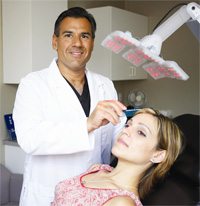Women Don’t Lose Their Hair—NOT!
Hair loss in women is far more common than one would think. In fact, one in every four women experience genetic hair loss. This translates to approximately 30 million women in the United States!
By far, genetics is the reason for hair loss in the vast majority of these women. There is no age discrimination with female pattern hair loss. It can be seen in girls in their teens all the way up to older women in the 80’s and beyond.
 Hair thinning is often devastating for these women who, sometimes, have no idea why they are losing hair. Many just need to look at their mothers, their aunts (on either side of the family), or their grandmothers to see why they are losing their hair. Often, however, either nobody that they themselves know had thinning hair or they do not have family historical knowledge to confirm hair loss in women from prior generations.
Hair thinning is often devastating for these women who, sometimes, have no idea why they are losing hair. Many just need to look at their mothers, their aunts (on either side of the family), or their grandmothers to see why they are losing their hair. Often, however, either nobody that they themselves know had thinning hair or they do not have family historical knowledge to confirm hair loss in women from prior generations.
Another thing that many—especially younger–women say is that, for example, their grandmother had thin hair, but it didn’t happen until she was older. Every day in my practice I report to patients that it is quite common for hair loss to be expressed at a much younger age than it occurred in previous generations. Why? I don’t know, but I have seen this throughout the last 27 years in helping women with their thinning hair. Many of these patients don’t want to hear this or to believe it, but it is the case.
So, what should be done to begin to help these women? The first thing I do is to obtain thorough personal and family histories of hair loss; next is to examine her scalp to determine a proper diagnosis. Sometimes this exam will show that the hair loss is not female pattern hair loss, but some other disease (such as alopecia areata or lichen planopilaris) that is causing the hair to thin or for the areas to be bald. In these cases, a referral to a dermatologist for a scalp biopsy or to an endocrinologist for further lab testing might be necessary along with further therapy.
If it is the first time I see a women with hair loss and they have not already had blood work done, I shall order it to determine if there might be a medical cause for the thinning hair. These results, however, rarely show this to be the case—especially if there is a positive family history present. If something does come back as an abnormal finding, I refer her to her family physician for further work up and treatment.
 It is unfortunate, but every day in my practice I see that many physicians will (not intentionally) mislead women with hair loss. From well known and respected dermatologists to their beloved general practitioners, women are wrongly told: “it’s normal to lose their hair with age”, “it’s a part of life—just accept it”, “you have great health, so why are you worrying about your hair”, “hair loss is caused by the stressful lives we all live”, “there is nothing that can be done about your thinning hair”. These are actual quotes from doctors to these women who then seek my expertise in hair restoration.
It is unfortunate, but every day in my practice I see that many physicians will (not intentionally) mislead women with hair loss. From well known and respected dermatologists to their beloved general practitioners, women are wrongly told: “it’s normal to lose their hair with age”, “it’s a part of life—just accept it”, “you have great health, so why are you worrying about your hair”, “hair loss is caused by the stressful lives we all live”, “there is nothing that can be done about your thinning hair”. These are actual quotes from doctors to these women who then seek my expertise in hair restoration.
You can imagine, during their hair loss consultation with me, how very discouraged they are after having heard such things from other physicians. They often come to me confused, angry, disillusioned, and even desperate about their “crowning glory” going away. Our consultation is very often extremely emotional—both for my patient and for me. There sometimes are lots of tears shed, but by the end of our visit, they have good and honest information that is not sugar-coated or unrealistic.
I can give these women accurate and sound advice, but I cannot make them start the treatments I recommend to help them. Some of these women want to seek the advice of doctor after doctor after doctor because they choose not to believe they have female pattern hair loss. That certainly is their right, but not uncommonly, they come back to see me to begin the treatments I recommended even years before. The sad part of this situation is that—every time—they return with less hair than they had during their initial examination.
One thing that I can promise to all patients with hair loss is that if they do nothing to treat it now, it definitely will become worse. How bad it will become or when it will get really bad cannot be answered by anyone on this Earth. In being honest with them, I have done my job. It is then up to them to move ahead with what I recommend for them to do to treat it.

